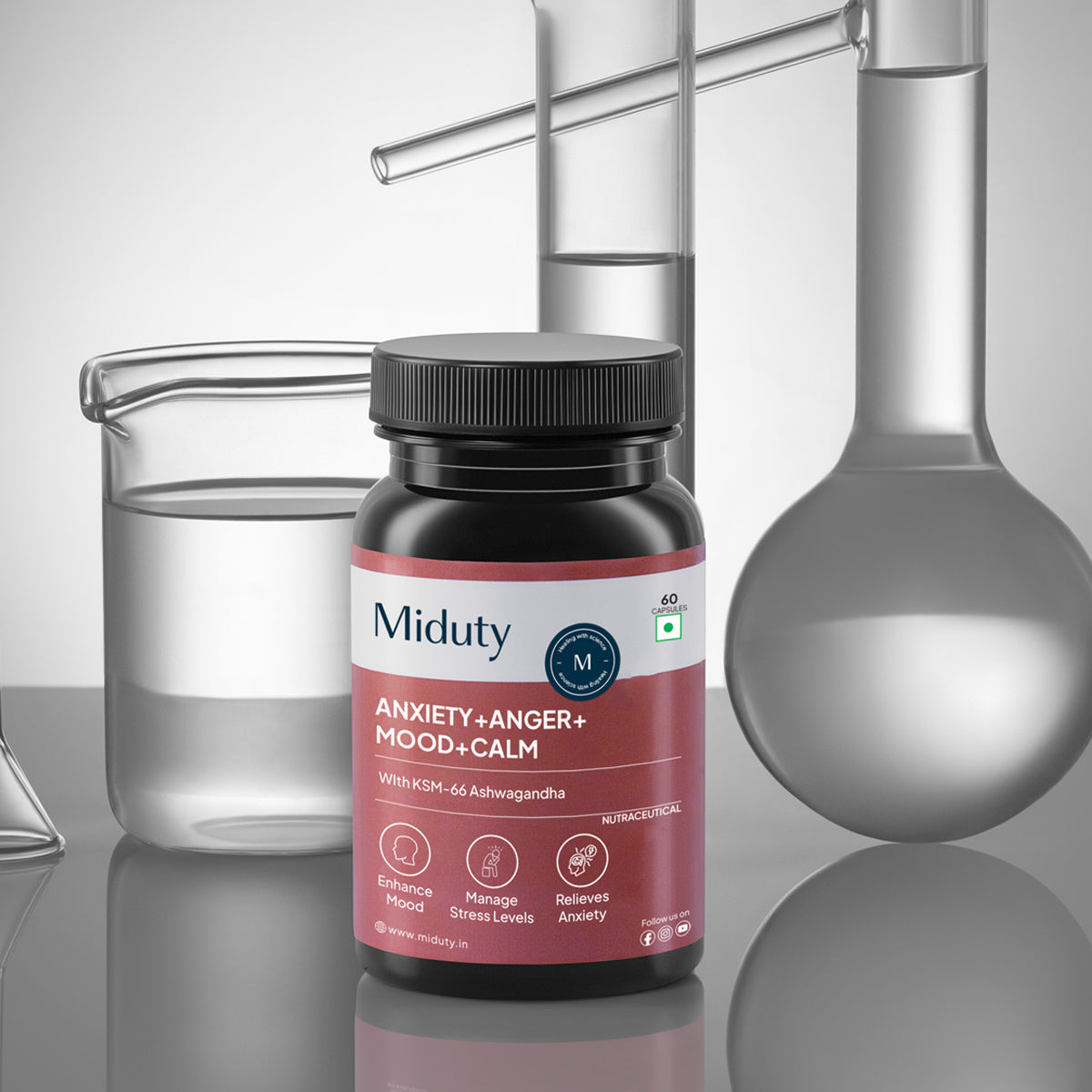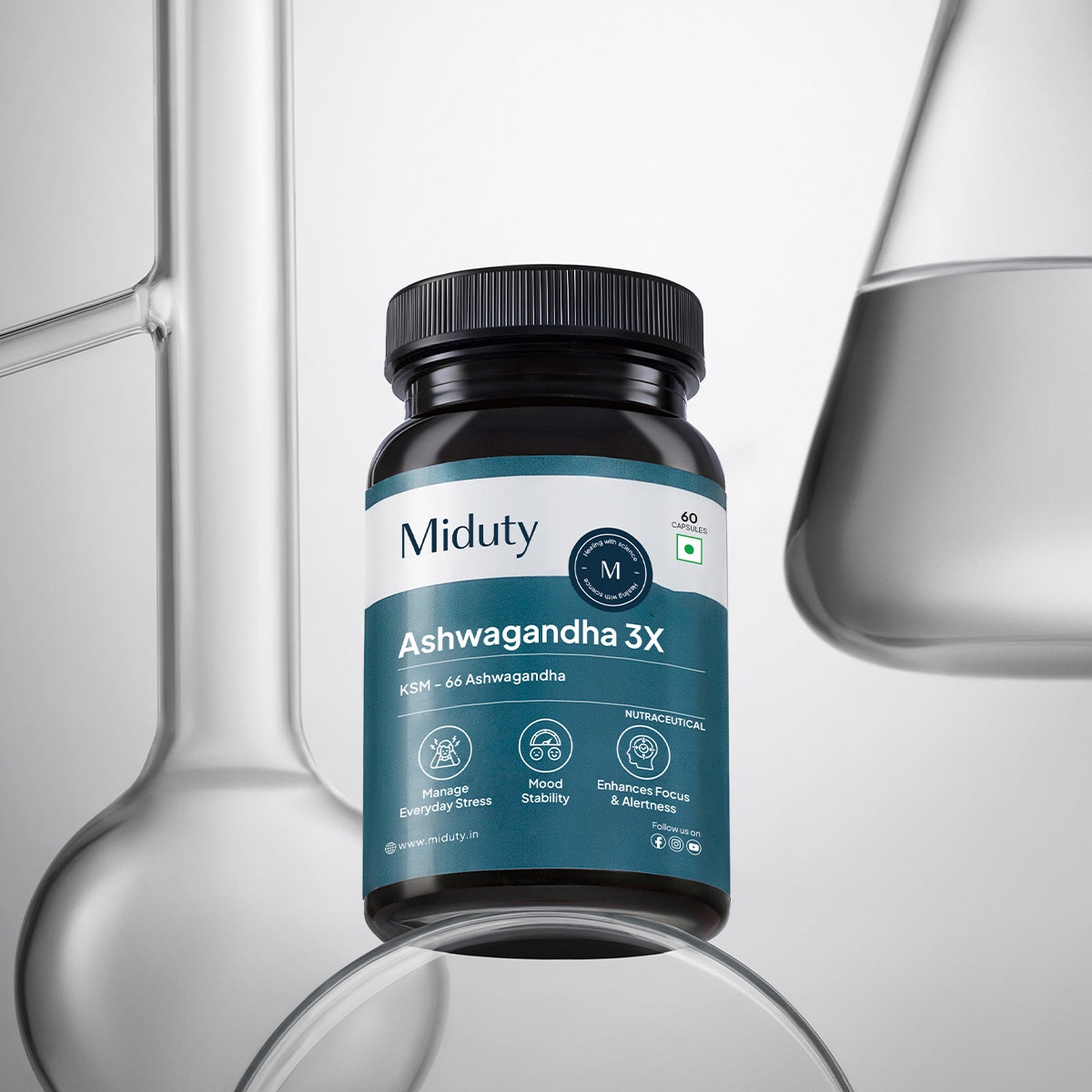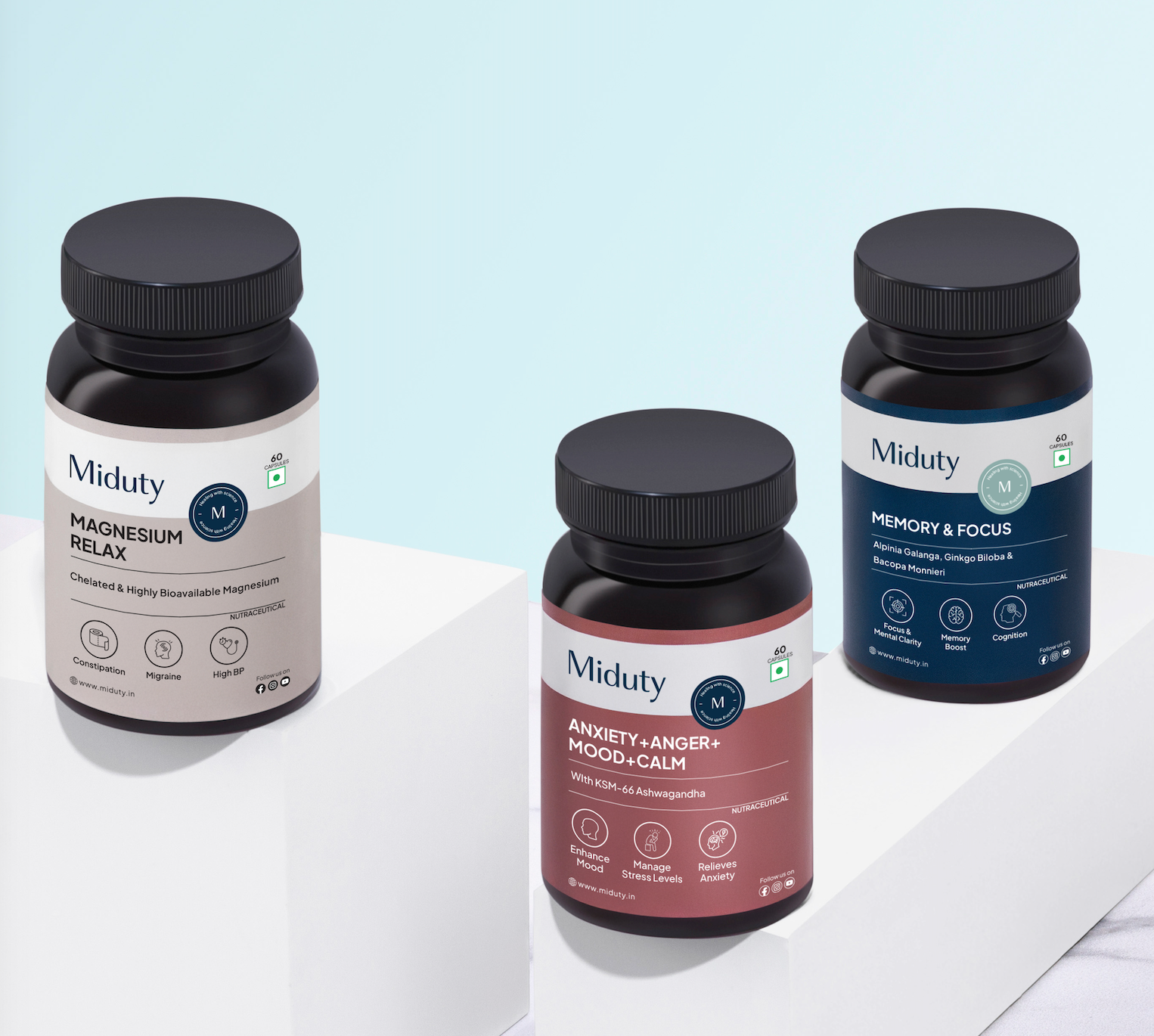
Anxiety: Causes, Symptoms, Types & Proven Ways to Manage It Naturally
Anxiety is a normal human response to stress. It's the body's way of staying alert in challenging situations. However, when anxiety becomes overwhelming, persistent, and disproportionate to real-life circumstances, it can interfere with daily life. Millions of people around the world experience anxiety disorders, making it one of the most common mental health challenges today.
The good news is that anxiety can be understood, managed, and even prevented with the right knowledge and lifestyle changes. This article explores the causes, symptoms, and types of anxiety, along with proven natural ways to manage it.
Key Takeaways
1. Anxiety is common but manageable: While millions struggle with anxiety, the right knowledge and habits can make recovery possible.
2. It's not just in your head: Genetics, brain chemistry, trauma, and even medical conditions all play a role in anxiety.
3. Know the signs: From racing thoughts to sleep problems, recognizing early symptoms is key to prevention and treatment.
4. Natural solutions work: Mindfulness, exercise, nutrition, supplements, and supportive relationships can calm anxiety naturally.
5. Professional help matters: If anxiety disrupts daily life, therapy and guidance from a healthcare provider can make all the difference.
What is Anxiety?
Anxiety is a natural human response to stress, characterized by feelings of worry, fear, or unease about future events or uncertain situations. It can be a normal reaction that helps individuals stay alert and prepared for challenges. However, when anxiety becomes excessive, persistent, or disproportionate to the actual threat, it may interfere with daily life and well-being. Common symptoms include restlessness, rapid heartbeat, difficulty concentrating, and sleep disturbances. While occasional anxiety is normal, chronic or intense anxiety may indicate an anxiety disorder, which often requires support, coping strategies, or professional treatment to manage effectively and improve overall mental health.
What Causes Anxiety?
Anxiety disorders don't arise from a single source—they develop from a mix of biological, psychological, and environmental factors. Understanding the root causes helps in better prevention and management.
1. Genetic Factors
A family history of anxiety can increase the likelihood of developing similar disorders. While genetics don't guarantee anxiety, they can make a person more vulnerable.
2. Brain Chemistry
Imbalances in neurotransmitters such as serotonin, dopamine, and GABA affect how the brain responds to stress. When these chemicals are out of balance, it can trigger heightened anxiety responses.
3. Stress and Trauma
Life events such as childhood trauma, financial struggles, or major losses can act as triggers. Prolonged stress builds up over time, making the brain more sensitive to anxious feelings.
4. Medical Conditions
Thyroid issues, heart problems, and chronic illnesses can sometimes cause or worsen anxiety. In some cases, side effects of medication or withdrawal from substances like alcohol or caffeine may also trigger anxiety.
What are the Symptoms of Anxiety?
Anxiety manifests in both the mind and body. Recognizing the symptoms early can help in seeking timely support.
Psychological/Emotional Symptoms
1. Persistent and excessive worry: Constant fear or concern about various aspects of life, often out of proportion to the situation.
2. Difficulty controlling anxious thoughts: An individual may find it hard to stop or manage their negative or fearful thinking patterns.
3. Restlessness or irritability: Anxiety can cause agitation, making it hard to relax and leading to frustration or mood swings.
4. Racing thoughts or difficulty concentrating: The mind may feel overwhelmed with rapid, intrusive thoughts, making it hard to focus on tasks.
5. Avoidance of social or stressful situations: To reduce feelings of anxiety, people may avoid gatherings, challenges, or responsibilities, which can impact daily life.
Physical Symptoms
1. Increased heart rate or palpitations: Anxiety activates the body's "fight-or-flight" response, causing a pounding or irregular heartbeat.
2. Shortness of breath or rapid breathing: A feeling of being unable to catch one's breath, often linked with panic or heightened stress.
3. Muscle tension and headaches: Prolonged stress tightens muscles, leading to stiffness, aches, or tension headaches.
4. Excessive sweating or trembling: The nervous system responds to stress by triggering sweating and visible shaking.
5. Gastrointestinal discomfort or nausea: Anxiety affects digestion, leading to stomach pain, nausea, or bowel changes.
6. Sleep disturbances: Worry and an overactive mind can make it difficult to fall asleep or stay asleep, resulting in fatigue.
If these symptoms persist for most days over six months, it may point toward a diagnosable anxiety disorder.
Types of Anxiety Disorders
Anxiety disorders come in several forms, each with its own unique characteristics.
1. Generalized Anxiety Disorder (GAD)
Marked by constant, excessive worry about everyday matters such as health, work, or family. Symptoms often include muscle tension, fatigue, and irritability.
2. Panic Disorder
Characterized by sudden and repeated panic attacks—episodes of intense fear accompanied by physical symptoms like chest pain, sweating, and shortness of breath.
3. Social Anxiety Disorder
A deep fear of being judged, embarrassed, or humiliated in social situations. People with this disorder often avoid public speaking, gatherings, or meeting new people.
4. Specific Phobias
An intense and irrational fear of a specific object or situation—such as heights, flying, or animals—that often leads to avoidance behavior.
5. Separation Anxiety Disorder
Common in children but also affecting adults, this type involves extreme fear or distress about being separated from loved ones.
How to Manage Anxiety?
While professional treatment is often necessary for severe cases, many natural strategies can reduce anxiety and support long-term mental health.
1. Cognitive Behavioral Therapy (CBT)
CBT is considered the gold standard for treating anxiety because it helps reframe negative thought patterns that fuel fear and worry. By breaking problems into smaller, more manageable steps, it empowers individuals to respond more rationally and calmly to stressful situations. With practice, these skills create long-term resilience against recurring anxiety.
2. Mindfulness and Meditation
Practices like meditation, deep breathing, and yoga activate the body's relaxation response and reduce overactivity in the stress centers of the brain. Even a short daily session can help bring clarity, reduce racing thoughts, and improve emotional balance. Over time, mindfulness increases awareness, helping individuals respond rather than react to anxiety triggers.
3. Regular Exercise
Movement stimulates the release of endorphins, which naturally boost mood and counter stress hormones like cortisol. Whether it's walking, running, dancing, or yoga, physical activity improves both mental and physical health. Consistency is key—just 30 minutes a day can make a noticeable difference in reducing anxious feelings.
4. Balanced Diet
What you eat directly impacts how your brain and body cope with stress. Nutrient-rich foods like leafy greens, fatty fish, and nuts support healthy brain chemistry and reduce inflammation linked to anxiety. Limiting stimulants like caffeine and sugar prevents spikes in energy and mood crashes that worsen anxious thoughts.
5. Adequate Sleep
Sleep and anxiety are deeply connected—poor rest worsens anxiety, and anxiety often disrupts sleep. Establishing a bedtime routine, such as avoiding screens, dimming lights, and practicing relaxation, improves sleep quality. Restful sleep gives the brain the recovery time it needs to process emotions and build resilience against stress.
6. Breathing Techniques
Intentional breathing helps slow down the heart rate and signals the nervous system to relax. Methods like diaphragmatic breathing or the 4-7-8 technique can be practiced anywhere, making them powerful tools during moments of heightened stress. Over time, these exercises train the body to respond to anxiety with calm rather than panic.
7. Herbal Remedies and Natural Supplements
Herbal options like ashwagandha, chamomile, and lavender, as well as supplements such as magnesium and L-theanine, have calming effects on the mind and body. These natural remedies can reduce tension, improve sleep, and promote relaxation without harsh side effects. However, it's always important to consult a healthcare professional before adding them to your routine.
8. Social Support
Human connection acts as a buffer against anxiety by providing comfort, reassurance, and perspective. Talking to loved ones or joining a support group reduces feelings of isolation and makes challenges feel less overwhelming. Simply knowing you're not alone can significantly ease emotional burdens.
9. Limiting Stimulants
Substances like caffeine, nicotine, and alcohol can overstimulate the nervous system, making anxiety symptoms worse. Cutting back or eliminating them gives your body a chance to stay balanced and calm. Replacing these habits with healthier alternatives, like herbal tea or mindful relaxation, supports long-term stability.
10. Journaling and Self-Reflection
Writing down your thoughts creates clarity and helps release worries that would otherwise stay bottled up in the mind. Journaling can also reveal patterns and triggers, making it easier to address root causes of anxiety. Practicing gratitude journaling shifts focus away from fear and toward positivity, strengthening emotional resilience over time.
How to Choose the Best Supplement for Anxiety?
With so many options available, choosing the right supplement for anxiety can feel overwhelming. A good supplement should focus on ingredients that are scientifically researched for reducing stress, improving mood balance, and supporting overall mental well-being. Look for natural compounds like ashwagandha, L-theanine, GABA, magnesium, and adaptogenic herbs, as they are known to promote calmness and resilience against stress.
It's also important to consider the quality and purity of the supplement. Products that use clinically tested extracts in bioavailable forms ensure better absorption and results. Always check that the formulation is free from harmful additives and artificial fillers.
One powerful option is an anxiety supplement which is formulated with superior KSM-66 Ashwagandha, L-Theanine, GABA, and Organic Holy Basil. Together, these ingredients help reduce stress, stabilize mood swings, promote relaxation, and improve emotional balance. This blend offers natural support for regaining control over anxiety, irritability, and mental restlessness—without the side effects associated with synthetic options.
When to Seek Professional Help?
If anxiety begins interfering with work, relationships, or everyday activities, it's important to consult a healthcare professional. A mental health provider can recommend therapy, medication, or a combination of treatments tailored to individual needs.
Immediate help should be sought if anxiety is accompanied by depression, substance misuse, or thoughts of self-harm.
Conclusion
Anxiety is a common but manageable condition. By understanding its causes, recognizing symptoms early, and practicing natural coping strategies, it's possible to regain control and improve overall quality of life. Supplements, lifestyle changes, and supportive practices can make a big difference, especially when combined with professional guidance. With the right approach, consistency, and support, you can build resilience, restore balance, and move toward a calmer, healthier mind.
Frequently Asked Questions on Anxiety -
Q1 - What is the main cause of anxiety?
Anxiety does not arise from a single cause but rather from a complex combination of biological, psychological, and social factors. Genetics, brain chemistry, and personality traits can make some individuals more vulnerable, while environmental influences such as trauma, abuse, or ongoing stress play a significant role. In people with a genetic predisposition, difficult life events or major losses may trigger anxiety.
Q2 - Can I live a normal life with anxiety?
Individuals with anxiety disorders experience ongoing worry and fear that can interfere with everyday activities and overall well-being. Although living with anxiety may feel overwhelming and difficult, effective treatment and coping strategies can help. With the right support, many people learn to manage their symptoms and lead healthy, fulfilling lives.
Q3 - How do you manage anxiety?
To cope with anxiety, you can practice relaxation techniques such as deep breathing, meditation, and mindfulness to ease tension and quiet your thoughts. Making healthy lifestyle adjustments, including regular physical activity, balanced nutrition, and consistent sleep routines, also supports emotional well-being and helps reduce anxiety over time.
Q4 - Is anxiety a mental illness?
Yes, anxiety disorders are considered a type of mental illness, marked by overwhelming fear, worry, and physical tension that disrupt everyday functioning. While it is normal for everyone to feel anxious at times, an anxiety disorder is different, it involves more intense, persistent, and difficult-to-control feelings of dread or unease that are often out of proportion to the actual situation.
Q5 - Who is most affected by anxiety?
Women and adolescent girls are disproportionately affected by anxiety disorders, although anyone can develop them. Several factors increase the risk, including a family history of anxiety, exposure to trauma, and the presence of other mental health or chronic medical conditions. On a global scale, prevalence rates tend to be higher in regions such as North America and Latin America, while certain anxiety disorders are more common in specific age groups.
References












